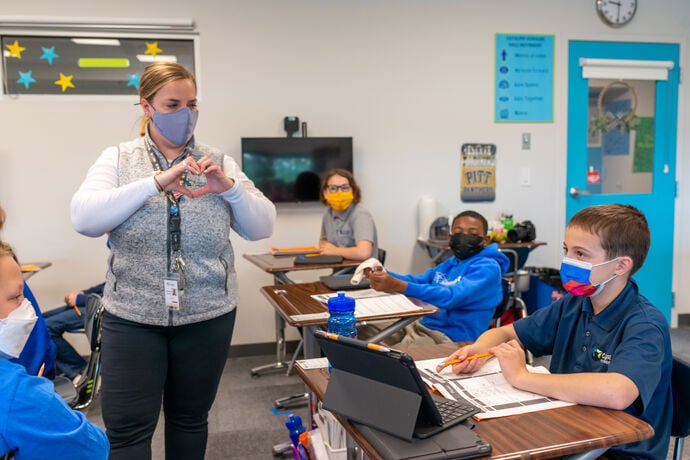After Observing Their Local Educational Landscape, Two TFA Alums Launch a School Offering Something That Was Largely Absent

When Teach For America alum Tatiana Epanchin (who taught with the ‘93 corps in Greater New Orleans) moved to Washington in 2014, opening a charter school was not in her plans. But within a few years that changed. Epanchin met fellow TFA alum and transplant Amanda Gardner (who taught with the ‘00 corps in South Louisiana), who, like her, had deep experience running charter schools and charter networks in other parts of the country.
After observing the local educational landscape in Washington, the duo decided they should launch a school offering something that was largely absent.
“We were both struck by the amount of resources public schools get, and the complacency we saw around making sure that school is amazing for all young people,” Tatiana said. In particular, she said, students with multiple “adverse childhood experiences” seemed to fall through the cracks in some local schools.
“We felt there was a real need for a school where all students who attend it are seen, known, loved, and challenged.”
Before developing a school plan, Tatiana and Amanda talked to hundreds of community members around kitchen tables, at coffee shops, and at community events. Then they assembled and worked with a design team of community members for 18 months to develop their thinking.
All of this talking and planning resulted in an 800-page charter school application to create Catalyst Public Schools, a K-8 school to be located in Bremerton.They submitted the application in 2019. The Washington State Charter School Commission approved it unanimously.
Both Tatiana and Amanda have extensive experience working with successful charter school networks. Tatiana spent 14 years working for Aspire Public Schools in Oakland, CA, first as a classroom teacher, then an assistant principal, principal, and finally a regional superintendent overseeing 12 Bay Area Aspire schools. Amanda ran high-performing charter schools in the Boston area, as well as a charter school leadership and incubation program, Innovate Public Schools in the Bay Area.
Today, Catalyst is a K-8 public charter school in Bremerton, serving almost 500 students. It opened in the fall of 2020, fully remote at first because of the Covid-19 pandemic. The school is grounded in its five core values: belonging, resilience, achievement, vulnerability, and enthusiasm.

“The one that's actually most central to everything we do is belonging,” Tatiana said. Creating that sense of belonging begins at the start of each day with Sunrise, which Tatiana described as a time to “unite and connect with each other while learning and practicing some discrete skills around how to manage ourselves and how to manage ourselves with others, as well as build social perspective through listening and talking with others.”
One unique feature of Catalyst is a class called Change Maker Space, which helps scholars learn about local issues where they can involve themselves and help effect change. By the time students move on from Catalyst to high school, they will have learned through Change Maker Space experiences that they can dive deep into a passion they have developed, alone or with classmates, and “change the world even if they’re not an adult.”
As an example, Tatiana said, one group of students worked with the Great Peninsula Conservancy, a local environmental nonprofit, on a project to remove non-native plant species from the area, after studying the detrimental impacts non-native species can have on the environment.
“Our school is a thriving little place.”
Catalyst also prides itself on having recruited a staff that largely mirrors the student body – about 50% people of color. “We feel really glad that a lot of our kids see themselves in our faculty and in the people with whom they interact every day.”
Bremerton is home both to a large naval shipyard and base, and this creates some unique challenges for families and students. Many active-duty parents, especially those who work on submarine crews, are away from home for extended periods, meaning many two-parent families operate with one parent for months at a time. This creates unique social-emotional needs among Catalyst students.
It also created an urgency to get Catalyst opened for in-person learning during Covid for as many students as possible as soon as the State of Washington allowed. Parents whose partner was away were stressed if they needed to go to work but had students sitting in front of a computer at home.
By January 2021, Catalyst was able to offer in-person learning to any family who desired a seat. That kind of attention to family and student needs is a large part of what has made the school a success in its early years.
“Our school is a thriving little place,” Tatiana said, pride evident in her voice.
This piece is written by freelance writer, Alan Gottlieb.


